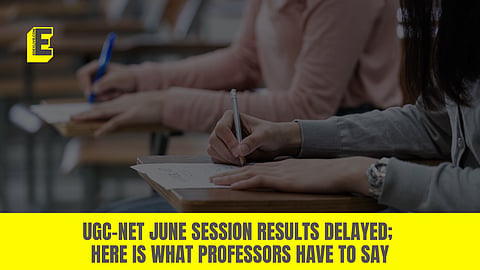

In 2024, the National Testing Agency (NTA) faced numerous challenges, including last-minute exam cancellations, paper leaks, allegations of malpractice, and delays in exam cycles.
Once again, the exam conducting body is under scrutiny on social media and in academic circles due to the delay in releasing results for the University Grants Commission - National Eligibility Test (UGC-NET) June 2024 session.
Academics argue that the introduction of centralised exams like the UGC-NET and Common University Entrance Test (CUET) for PhD and research programmes has undermined the autonomy of public institutions, disrupting academic cycles and impacting student intake on a larger scale.
Speaking about this, Prof Avinash Kumar, Secretary, Jawaharlal National University Teachers’ Association (JNUTA) and Assistant Professor of Political Studies in the Centre for Informal Sector and Labour Studies, said, “We have been raising this issue ever since we learned about the compromises in NTA-led exams. The autonomy of public institutions, including their ability to set their own academic calendars, has been severely undermined since the NTA's inception. Despite numerous scams and widespread outcry, one has to wonder why these exams remain under NTA's control. What is at stake here? This situation points to a deeper malice within the education system.”
It might be recalled that the UGC-NET June 2024 exam was held on June 18 and then cancelled the very next day, on June 19, on claims that the exam had been "compromised". This happened in the light of the National Eligibility cum Entrance Test - Undergraduate (NEET-UG) paper leak row.
The exam was then conducted on August 27, 28, 29 and 30, and on September 2, 3, 4 and 5.
“In a country like India, many young people from lower middle-class backgrounds and first-generation learners experience significant pressure to start earning. However, these students are choosing to invest in education and nation-building by opting to stay out of the labour market. Now, you are actually dissuading them, pushing them away from academia through delays and scams,” Kumar alleged.
Professor Vijaya Venkataraman from the Department of Germanic and Romance Studies at Delhi University shares similar concerns regarding the introduction of centralised admission tests for PhD courses.
“More than anything, more than delay in academic cycles, it is about the uncertainties that these young scholars have to face for four to six months. Especially when PhD admissions are in question, these candidates have to choose if they want to pick employment or go for research. Delays and uncertainties demotivate them from their academic ventures,” said Prof Venkataraman.
Do centralised tests serve the purpose of PhD courses?
It might be recalled that earlier this year, there were discussions regarding the revival of JNU’s in-house entrance exam for PhD admissions instead of a centralised NTA-led test.
The proposal was supported by the university’s administration as well as the faculty members. However, a definite decision is yet to be taken.
“All schools have indicated their consent to revert PhD admissions to an in-house exam format. Each centre has communicated this to the administration, and we hope it will be discussed at the Academic Council meeting scheduled for October 10,” said Prof Avinash Kumar.
While disrupted academic cycles is one reason behind this proposition, it might also be noted that many professors have opined that an objective-type exam does not serve the purpose for PhD and research-level courses.
“Over the years, the quality of student intake has also been compromised. An objective-type exam cannot effectively assess what is necessary for PhD admissions, particularly in Social Sciences and Humanities, where a candidate's writing ability and subject understanding are crucial. These entrance exams reduce everything to facts and multiple-choice questions. Additionally, each institute has specialised fields, and previously, students could select programmes based on their interests — this flexibility is now lost. The same goes for universities,” expressed Professor Vijaya Venkataraman.
Abha Dev Habib, Associate Professor, Department of Physics at Miranda House, DU, also added that the centralised tests are pushing scholars to choose private universities due to delays in academic cycles.
